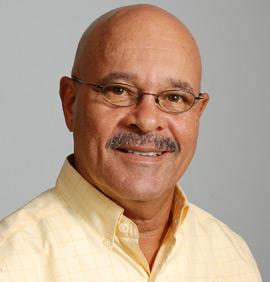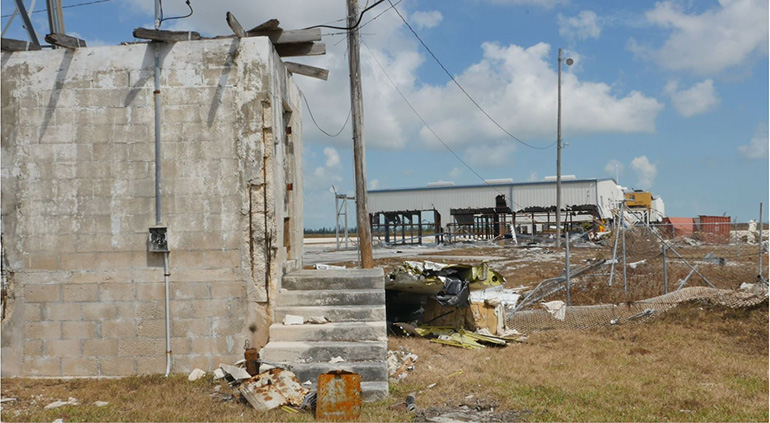By Tom Tracy - Florida Catholic

Photographer: COURTESY
Basil Christie is a former director of religious education for the Nassau Archdiocese who went on to work at an insurance company and now coordinates the Nassau Archdiocese's hurricane preparedness and recovery efforts.
MIAMI | As catastrophic as Hurricane Dorian was in the northern Bahamas, the characteristic optimism and sunny outlook there will help soften the painful recovery to come, according to a hurricane preparedness volunteer in Nassau.
“There was nothing we could have done to prepare (for Hurricane Dorian), but when you talk to me again five years from now I will be happy to tell you we will be back on our feet again because we are very resilient people,” said Basil Christie, a former religious education director in the Archdiocese of Nassau and now retired insurance executive.
Christie, who said he regularly assists the Church with hurricane preparedness and recovery in the Bahamas, spoke with the Florida Catholic by phone Sept. 10. He is a native of the Bahamas and a graduate of St. John’s University in Minnesota.
He said for the past 15 years in his retirement he has traveled to the various islands of the Bahamas to coordinate and promote hurricane preparedness programs, as well as follow-up recovery efforts after many lesser hurricanes touched parts of the nation.
Christie estimates that each year at least some part of the Bahamas has suffered hurricane damage. Although the Bahamas has strong building codes, Dorian’s more than 200 mile-per-hour wind gusts and considerable storm surge means those codes will have to be revisited.
“Normally, the maximum wind is 110 mph and restricted to the southern islands — most years I would go to Long Island, Cat Island, San Salvador and places which are not heavily populated, and I would supervise repairs to the roofs,” he said. “But in Abaco Island and Grand Bahamas these homes are simply blown off the foundation so it is a different situation.”
“There are lessons to be learned from this: Our building code needs to be augmented, and we will need better shelters,” Christie said, adding that “so many families have stories of watching their wives or children washed out to sea.”
Christie said that since Hurricane Dorian passed, he has been helping coordinate volunteer efforts from Nassau, where cell phone communications are intact. But as early as this weekend he planned to travel to Grand Bahama.
“The important thing is the hurricane only seriously damaged Grand Bahama and Abaco,” he said. “Nassau, Eleuthera, Bimini, Harbour Island all felt (Dorian) but nothing like Grand Bahama and Abaco Islands.”
Families arriving in New Providence, where Nassau is situated, are being placed in ad hoc housing in gymnasiums, orphanages, convents, hostels, and hotel rooms, sometimes four and five people to a room.
“We are having to create as we go, and many (evacuees) have families in Nassau,” Christie said, adding that Catholic and public schools in the Nassau area have been accommodating dislocated students.
“The kids will be taken care of. Some have lost their parents, and you are at a loss of what to say. The stories are just incredible, but we are going to survive this,” he said.
Christie echoed the concerns that the official death toll is likely to soar, particularly among the shantytown communities of undocumented people reportedly living in Abaco. “There are a lot of dead bodies and it is the first time in our history that we had to initiate mass graves whereas others were simply taken out to sea by the (storm surge).”
Christi praised the generosity of businesses and organizations in the Bahamas, the international cruise lines, as well as other Caribbean nations and agencies in Florida and the United States for sending material and financial support following the storm.
“This has brought out the good in people and the notion that we are our brother’s keeper,” Christie said.
According to his bio at the website for Nassau’s St. Augustine College, Christi enrolled in the seminary at St. John’s Abbey in Minnesota. He later changed his focus to modern languages, and upon graduation began his life of service by volunteering for missionary work in Mexico.
On his return to Nassau he embarked on his teaching career at Aquinas College. Following his stint as guidance counselor there, he was appointed director of religious education for the Nassau Archdiocese. Later he took up employment at J. S. Johnson Insurance Agency where he served as senior underwriter and human resources manager.

Photographer: Bahamas Paradise Cruise Line
A view of the destruction caused at Grand Bahama International Airport in Freeport by Hurricane Dorian. Although building codes are strong on the islands, they were no match for nearly 36 hours of Dorian's sustained winds of 185 mph.

